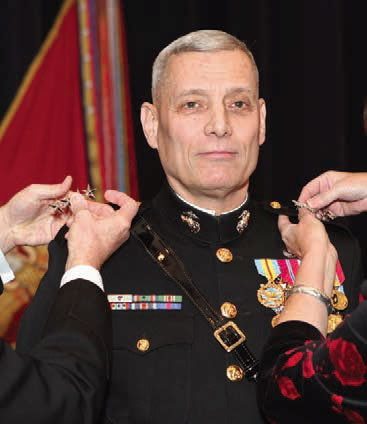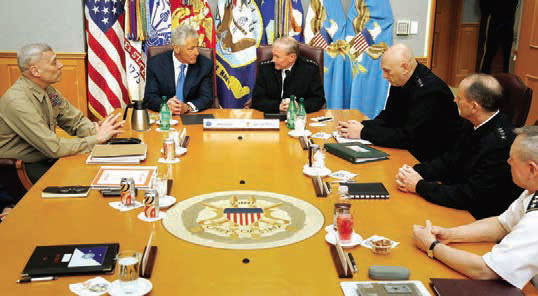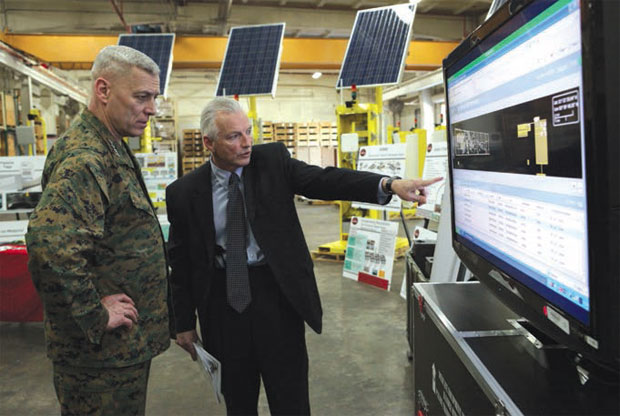
Broad shoulders: General John Paxton ’73, MEN ’74, receives his four stars; the hands at right belong to his wife, Deborah McCoy Paxton ’75, BS Nurse ’77. Top: Paxton’s “challenge coin,” a keepsake traditionally given to honor visitors and colleagues.CPL. TIA DUFOUR
John Paxton ’73, MEN ’74, goes to work in one of the world’s most iconic buildings: the Pentagon. As Assistant Commandant of the Marine Corps, Paxton is a four-star general and the service’s number-two officer. One of the highest ranking military officers in Cornell alumni history, Paxton didn’t take ROTC; the former civil engineering major signed up after stopping at a recruiter’s table in Barton Hall. His office, complete with a view of the Washington Monument, is on the Pentagon’s coveted outer ring. In addition to a painting depicting the Corps’ origins in the Revolutionary War, the decor includes photos of Paxton’s father, three uncles, and an aunt—all World War II veterans—as well as six clocks set to various time zones where Marines are serving around the globe.
The son of a draftsman and a paralegal, Paxton grew up in suburban Philadelphia. He played varsity football and lacrosse on the Hill, was a member of Delta Upsilon—nine fraternity brothers attended his four-star promotion ceremony—and served as assistant freshman lacrosse coach while earning a master’s degree in engineering. His wife, Deborah McCoy Paxton ’75, BS Nurse ’77, is a nurse practitioner and mental health adviser to the Wounded Warrior Regiment in Quantico, Virginia, where she works with Marines suffering from post-traumatic stress and traumatic brain injury. “My wife has lived in twenty houses in thirty-three years,” Paxton notes. “Her dad, fortunately, was in the Air Force—so she knew what she was getting into.” The Paxtons, who have three grown children, live on the Corps’ oldest post: Marine Barracks, Washington, founded by Thomas Jefferson in 1801.
Constable’s nickname for such incidents is in honor of Jeff Hawkins ’79, the pioneering tech entrepreneur who has devoted considerable amounts of his time, energy, and fortune to understanding the human brain. Trained as an electrical engineer, Hawkins is a Silicon Valley legend: inventor of the Palm Pilot, founder of Palm Computing and Handspring, creator of the Treo line of smartphones. But in addition to mobile computing, Hawkins has another passion: he has itched to understand how the brain works ever since he was an adolescent who went to his local library looking for the definitive book on the subject and came up empty. Over the course of decades, he has developed a working theory of the brain—specifically its neocortex, which makes up 80 percent of its volume—as a system that makes sense of the world via memory, prediction, and pattern-recognition. (Hence the “Hawkins event.”)
Cornell Alumni Magazine: At the risk of getting you into hot water with your brothers in arms, how is the Marine Corps different from any other branch of the military?
John Paxton: All the services teach camaraderie and team spirit. But if I were to be parochial—and I’d say we don’t have a lock on it—we certainly have a high degree of esprit, of camaraderie. We are the smallest of the four services, but proud of who we are and what we do. And I think we instill that, starting at recruit training. So the thing that really separates us from the other services is the way we inculcate the ethos of the Marine Corps. That first twelve weeks is a formative period. It’s longer than in any other branch of the service. We not only teach leadership but also service before self, and team before self.

Top brass: Paxton (far left) attends Defense Secretary Chuck Hagel’s first Joint Chiefs of Staff meeting in March.JONATHAN ERNST/REUTERS/CORBIS
CAM: With an all-volunteer force, most Americans have never been in uniform. Can you describe what it’s like to serve in the Marines?
JP: We are conscious that only about one half of 1 percent of the population is in the military right now; it’s less than 3 million, and that’s Army, Navy, Air Force, Marine Corps, active, reserve, and Guard. The concept of service probably hasn’t changed in 237 years. It’s still primarily about doing what you think is right for your nation, being willing to wear the cloth of your nation—that’s what brings most people in. There’s the travel, the spirit of adventure, sometimes technical skills, but at the backbone it’s always about serving your country.
CAM: What’s the best part of your job?
JP: Working with Marines. There’s a bit of challenge to being in the Pentagon, because you feel kind of divorced from the rest of the Marine Corps. I’ve had the good fortune of being in command of Marines, working with them as they train, watching them in Afghanistan and before that in Iraq, and you get to see how truly dedicated and skilled they are.
CAM: How tough is your job right now, with the challenges facing the military?
JP: I’m fond of saying we have operational challenges, we have cultural challenges, and we have physical challenges. This isn’t unprecedented—it’s a sine wave—but they happen to be pretty stark right now. We’re getting ready to get out of Afghanistan, so we’ve had two large, sustained ground combat conflicts for the last eleven years; sequestration is here; continuing resolution is here; the fiscal challenges are monumental. And then things like same-sex relationships, women in combat—those are important cultural issues because we represent American society. How we deal with them is a challenge—and how we deal with them simultaneously is even harder. In the short term, the biggest problem is the budget. Sequestration will have a serious impact on all the departments, but particularly on Defense. We realize that we have to balance the national budget, and that’s incredibly important. But trying to do it in the middle of a conflict is tough.
CAM: How have you seen the military evolve over the course of your career?
JP: I’m an infantryman by background—the nuts and bolts of the Marine Corps, if you will—and I’ve had the opportunity to go all over the world and the great fortune of commanding at every level, from platoon to expeditionary force. Some things always change and some things never change. War technology has changed—new radios, aircraft, vehicles. But what hasn’t changed is the people, and that’s probably the reason I stay in, because we have high quality people from all walks of life and it’s motivating to work with them. Their virtues, values, honor, courage, commitment—it doesn’t change.
CAM: Have there been moments in your career when you were in combat and felt your life was on the line?
JP: I’ve been in a combat environment, in Somalia and in Iraq. In all candor I have never drawn my pistol or my rifle, never cleared a building like our young Marines do so fearlessly and heroically every day. I’ve been in combat environments, and been there often enough that I think I have a sense of the chaos and the fear, and what those Marines who go in there need in terms of training. What would it be like in the dark, in the cold, in the rain, in the gripping fear and chaos of combat? Not to know where the bad guy is, to watch a buddy get shot, either injured or killed, and then continue with the mission? That’s imbued in you from day one—that you push on, overcome the fear. Courage is not the absence of fear, it’s the ability to handle fear and press on.
CAM: What’s it like to come to work at the Pentagon every day?
JP: We jokingly call it the House of Pain; there are a lot of challenges to working in D.C., because things have a sense of urgency due to the politics involved—and that’s politics in a factual sense, not a pejorative one. You know that the stakes are high because the programs you’re trying to keep alive, the training that you’re trying to ensure, the policies that you’re trying to get in place, you believe are beneficial to the service and the nation.
CAM: Does part of you wish you were still overseas?
JP: Absolutely. You always think about what is going on with servicemembers around the world and what you can do to help. Your focus is on taking care of Marines out in the fleet.
CAM: These days, how do you connect with Marines? If you’re visiting a base, how can you be approachable, despite the four stars on your shoulders?
JP: The onus of responsibility is on the individual. You have to step out. It’s not perfunctory, like, “How’s the Marine Corps treating you? Are you getting your mail?” It’s, “How are you doing today? What’s your name? What’s your MOS—your occupation specialty? Where are you from? How do you like it? How long have you been here?” They have to have a sense that their leaders care about them, whether it’s a first sergeant or a lieutenant colonel.
CAM: When you walk down the street among people in civilian clothing, can you pick out the Marine?
JP: Absolutely.
CAM: How would you know?
JP: Obviously, the first thing you look at is the haircut. It’s a little bit of carriage too. I think Marines feel comfortable around other Marines. I can’t tell you the number of times I’d be out on a speaking engagement, or on recruiting duty, and somebody out of the clear blue would break out of the crowd. And as they started to walk toward you, it wasn’t a fear that, “Hey, somebody’s going to assault me,” or even “Somebody’s going to ask me for directions.” They would start to stand up a little taller, smile a bit more, and you’d say, “This guy’s a Marine.”
CAM: Given the trend toward obesity and inactivity in America, is there a concern that the country won’t produce enough qualified recruits?
JP: I don’t think so at all. I happened to be in the Pentagon on 9/11, about a hundred yards away from where the aircraft came in, so that’s a pretty stark reminder. My point is that in the aftermath of 9/11, there were some in the military and around the country who wondered how the new generation of our youth was going to step up. There were concerns that they played a lot of video games, that they didn’t physically train—but you watch soldiers, sailors, airmen, Marines, in theater in Iraq or Afghanistan and they are every bit as good or perhaps better than their forebears. They shoulder the load, in a literal and physical sense, and can do anything we ask them to do.
CAM: Coming out of an Ivy League school in the Seventies, how much of a culture shock was it to join the military?
JP: It was an incredible culture shock. Because I had played sports, it was not as physically challenging as I thought, but the mental aspect was very different. To come into the Marine Corps just as we were winding down from Vietnam was a huge thing. I remember times when I was running I just kind of chuckled to myself, “If some of the guys and gals I knew could see me now…”

Tour of duty: Paxton views an installation while visiting sites under the Corps’ Logistics Command and Systems Command.CPL. TIA DUFOUR
CAM: Have you seen a change in Americans’ attitude toward the military since you enlisted?
JP: I absolutely have, and it’s gratifying. I had many friends several years older who served in Vietnam, and there was a generation where the American public was unable or unwilling to make the distinction between the policy and those who executed it. We’ve made that distinction today. I think it’s a recognition that there are some great folks who are doing miraculous things for our nation. They care not whether it’s Democrat or Republican—they just want to serve.
CAM: What did it feel like to have that fourth star pinned on?
JP: The comment I made at the time was that one half of me felt light as a feather, and the other felt like I had a rock on my shoulder. Obviously, you never anticipate it. I came in as a second lieutenant; I thought if I was fortunate I’d become a first lieutenant and then be an engineer. So I never anticipated staying this long or rising this high. And there’s an incredible sense of responsibility too—the 237 years of history, the weight of the institution, the obligation to 197,000 Marines around the globe.
CAM: What about life in the Corps might the average civilian not understand?
JP: Every profession has rules and regulations, either written or unwritten. But I think the strongest thing about the Marine Corps is the fact that it is upfront —the willing and instantaneous obedience to orders. You don’t question. The expectation is there’s been a degree of thought, higher up, and it’s the right decision at the right time. And the other piece is trusting people, equipment, and training. There’s a sense of, “Okay, it’s gonna be hard, I’m not gonna like it, but we gotta do it. Let’s wade in and get it done.” If you get up at 4:30, you get up at 4:30. And if you work til 22:00, you work til 22:00. You just go.


